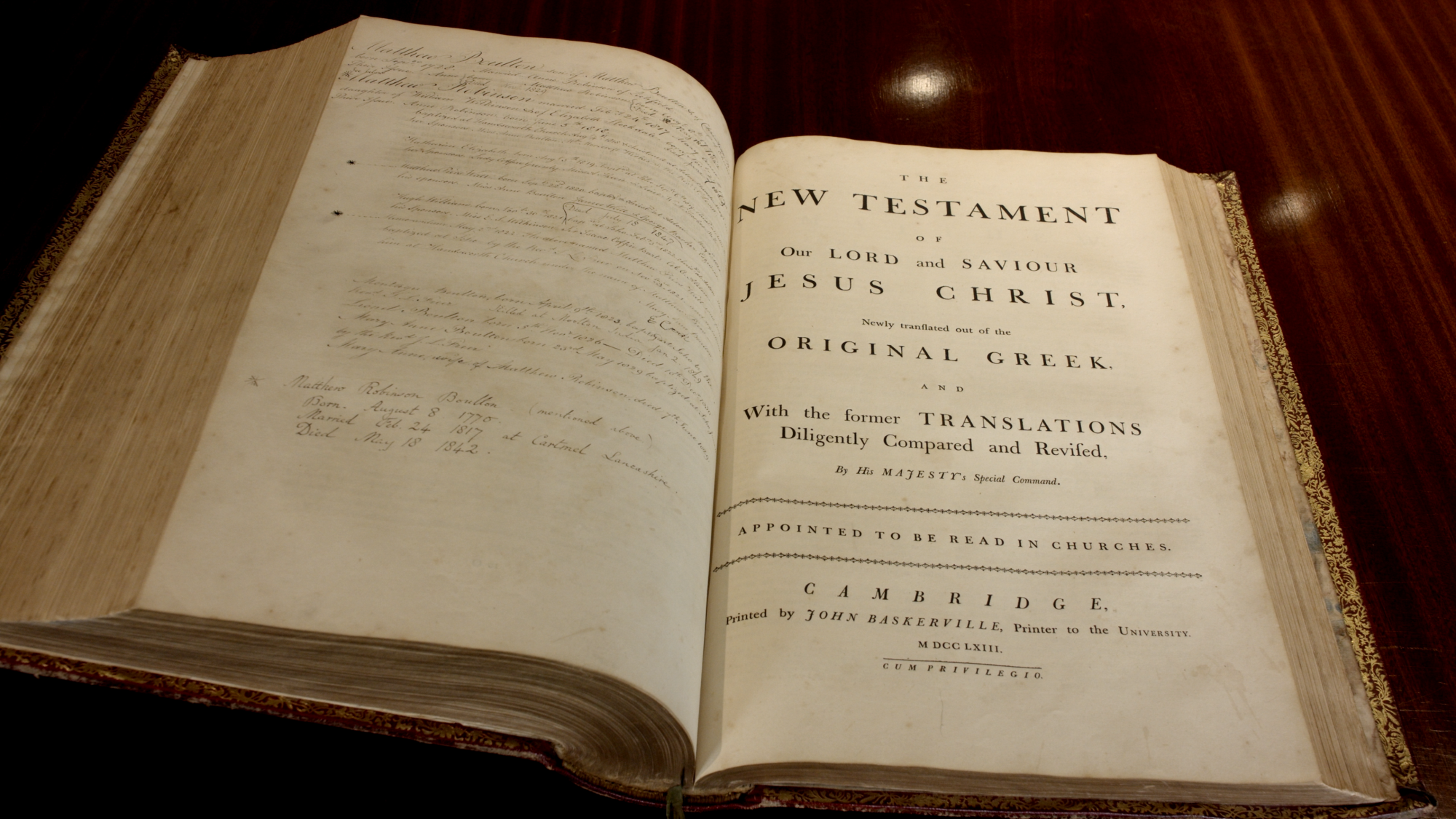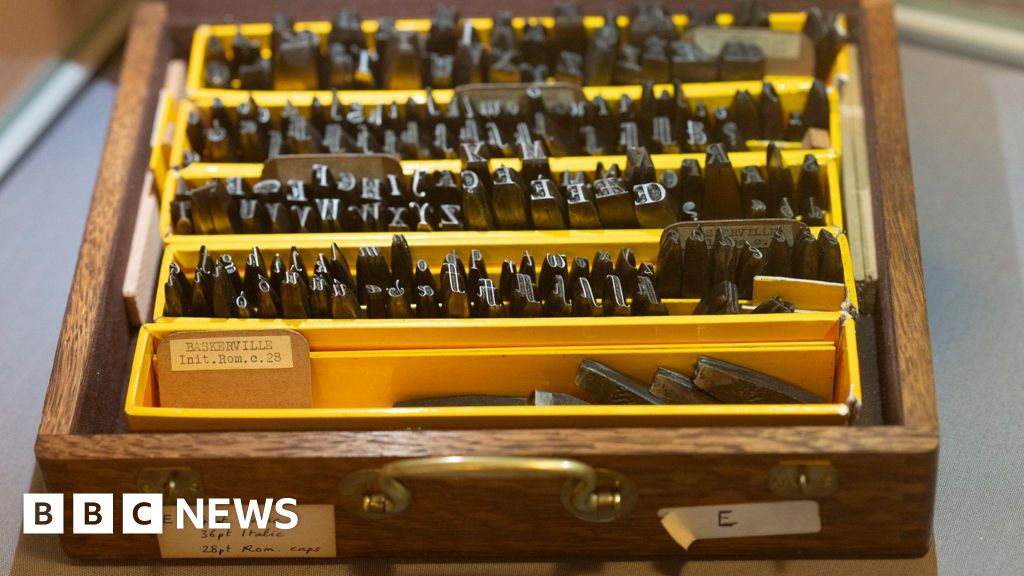Last week I attended a book launch for a new book : "John Baskerville, Art & Industry of the Enlightenment", Edited by Catholine Archer-Parré & Malcolm Dick, which was a selection of contributions to an earlier conference on Baskerville. Some of the chapter authors gave short presentations of their contributions. Some, such as one on Baskerville's Greek type and another on his endpapers were very specialist, but some were of general interest. I relate below some points of general interest.
Baskerville was born in Wolverley, close to Kidderminster in Worcestershire. It has generally been reported that he was born in Sion House in 1706, though, other than his recorded baptism, much has been assumed or estimated without certain proof . George Demidowicz, after surveying all the documents, has now pointed out that Sion house was not built till some years after John's birth, so cannot be the birthplace. The likely birthplace is downhill from the site of the house at John's father's inn , "Le Cock", close to the Kidderminster-Wolverhampton road. His father had been charged with entertaining a woman and keeping a disorderly house at Le Cock, indicating a dubious reputation. This is perhaps the reason that Baskerville was always somewhat reticent about his origins. His education is completely undocumented (as yet) though opinion is that he would have had to attend the local grammar school to get the knowledge to proceed in his professions. He initially became a gravestone engraver, which would have given him an interest in lettering, but also received money from being an absentee landlord of his father's lands (after his father's death in 1838) until selling them in 1864. Le Cock later became the Bulls Head, and then The Broadwaters Inn, but by 1938 it was a private house, later known as Brook house, which was demolished in 1938 to build a row of shops.
the date of him arriving in Birmingham, though quoted as 1726, is unclear, with no definite evidence till 1733. He did not remain a gravestone cutter for long and set up a school as a writing master. The site has now been identified as 7 The Bull ring, now under Selfridges. All remains were destroyed when the 1960s bull ring was constructed. there is also evidence that he occupied a property on the edge of St Martins. It is possible that this was concerned with his gravestone carving business. In around 1738 he occupied for two years a building next to and to the west of the Meeting House in new Meeting St, in addition to the others mentioned.
A couple of years later John became interested in Japanning and started a business at 22 Moor St (now under the two northern brick bays of the frontage of Moor St Station). this was only a short time after John Taylor had introduced the trade to Birmingham. John took out the first patent for japanning on metal and was very successful, though no known products of his manufactory have yet been identified. It is not clear where his knowledge to develop japanning came from . Possibly written treatises or association with others in the field. It is possibly of interest that the neighbouring workshop in Moor St had recently been vacated by John Bedford, a cutler, whose son was a japanner, and thus may have had contact with those proficient in the art. The profits enabled him to buy the Easy Hill property and build his house, which is approximately centred on the site between the main entrance of Baskerville House and the Hall of Memory. The site was known as the Binges, from which porobably Bingley house , then Hall got their names.
He remained into jappanning till at least 1870, but from 1850 took up his main interest of printing. In both sides of his business Sarah, his wife seems to hav ebeen active. indeed she continued the printing business for a time after john's death.
This is just a summary of some of the items possibly of interest to the forum that were covered in the meeting, and much more thoroughly in the book.
Baskerville was born in Wolverley, close to Kidderminster in Worcestershire. It has generally been reported that he was born in Sion House in 1706, though, other than his recorded baptism, much has been assumed or estimated without certain proof . George Demidowicz, after surveying all the documents, has now pointed out that Sion house was not built till some years after John's birth, so cannot be the birthplace. The likely birthplace is downhill from the site of the house at John's father's inn , "Le Cock", close to the Kidderminster-Wolverhampton road. His father had been charged with entertaining a woman and keeping a disorderly house at Le Cock, indicating a dubious reputation. This is perhaps the reason that Baskerville was always somewhat reticent about his origins. His education is completely undocumented (as yet) though opinion is that he would have had to attend the local grammar school to get the knowledge to proceed in his professions. He initially became a gravestone engraver, which would have given him an interest in lettering, but also received money from being an absentee landlord of his father's lands (after his father's death in 1838) until selling them in 1864. Le Cock later became the Bulls Head, and then The Broadwaters Inn, but by 1938 it was a private house, later known as Brook house, which was demolished in 1938 to build a row of shops.
the date of him arriving in Birmingham, though quoted as 1726, is unclear, with no definite evidence till 1733. He did not remain a gravestone cutter for long and set up a school as a writing master. The site has now been identified as 7 The Bull ring, now under Selfridges. All remains were destroyed when the 1960s bull ring was constructed. there is also evidence that he occupied a property on the edge of St Martins. It is possible that this was concerned with his gravestone carving business. In around 1738 he occupied for two years a building next to and to the west of the Meeting House in new Meeting St, in addition to the others mentioned.
A couple of years later John became interested in Japanning and started a business at 22 Moor St (now under the two northern brick bays of the frontage of Moor St Station). this was only a short time after John Taylor had introduced the trade to Birmingham. John took out the first patent for japanning on metal and was very successful, though no known products of his manufactory have yet been identified. It is not clear where his knowledge to develop japanning came from . Possibly written treatises or association with others in the field. It is possibly of interest that the neighbouring workshop in Moor St had recently been vacated by John Bedford, a cutler, whose son was a japanner, and thus may have had contact with those proficient in the art. The profits enabled him to buy the Easy Hill property and build his house, which is approximately centred on the site between the main entrance of Baskerville House and the Hall of Memory. The site was known as the Binges, from which porobably Bingley house , then Hall got their names.
He remained into jappanning till at least 1870, but from 1850 took up his main interest of printing. In both sides of his business Sarah, his wife seems to hav ebeen active. indeed she continued the printing business for a time after john's death.
This is just a summary of some of the items possibly of interest to the forum that were covered in the meeting, and much more thoroughly in the book.
Last edited:


